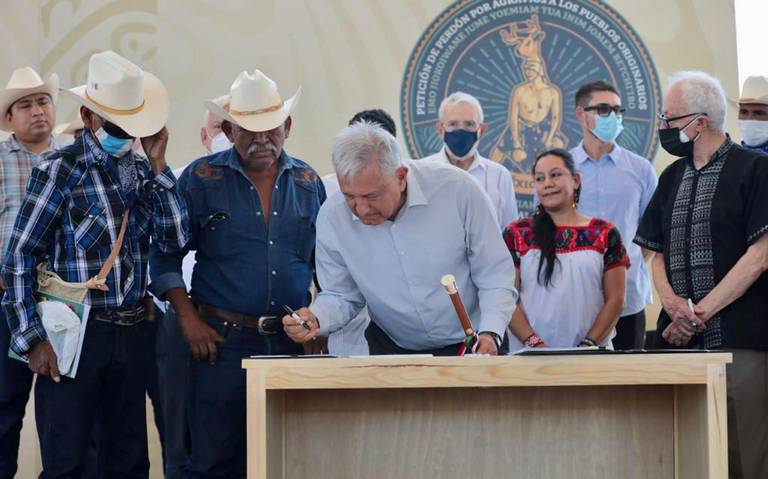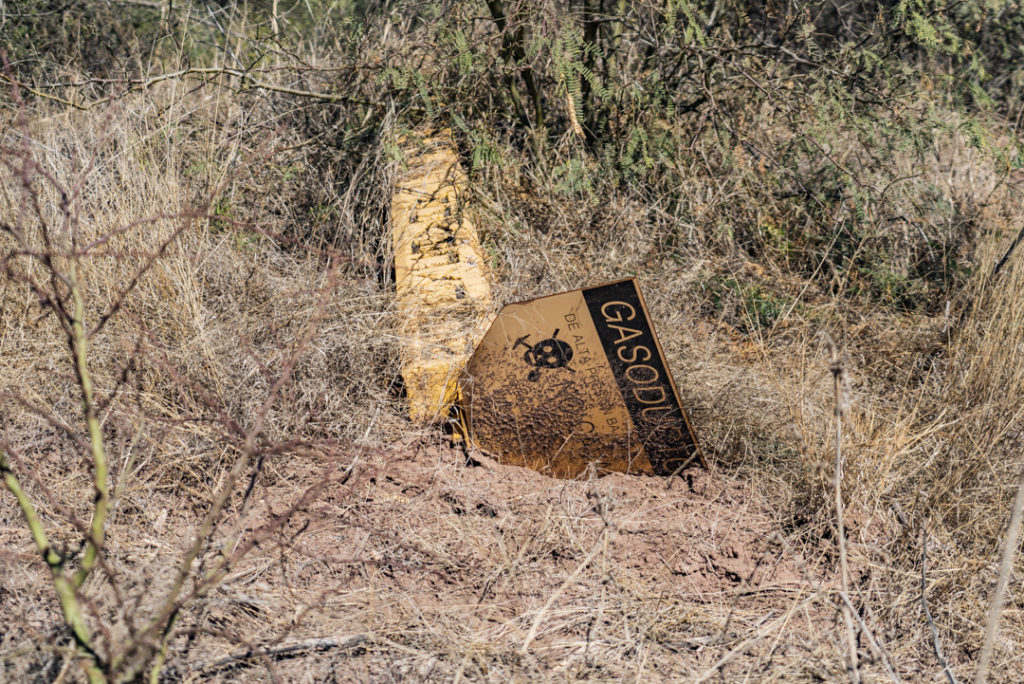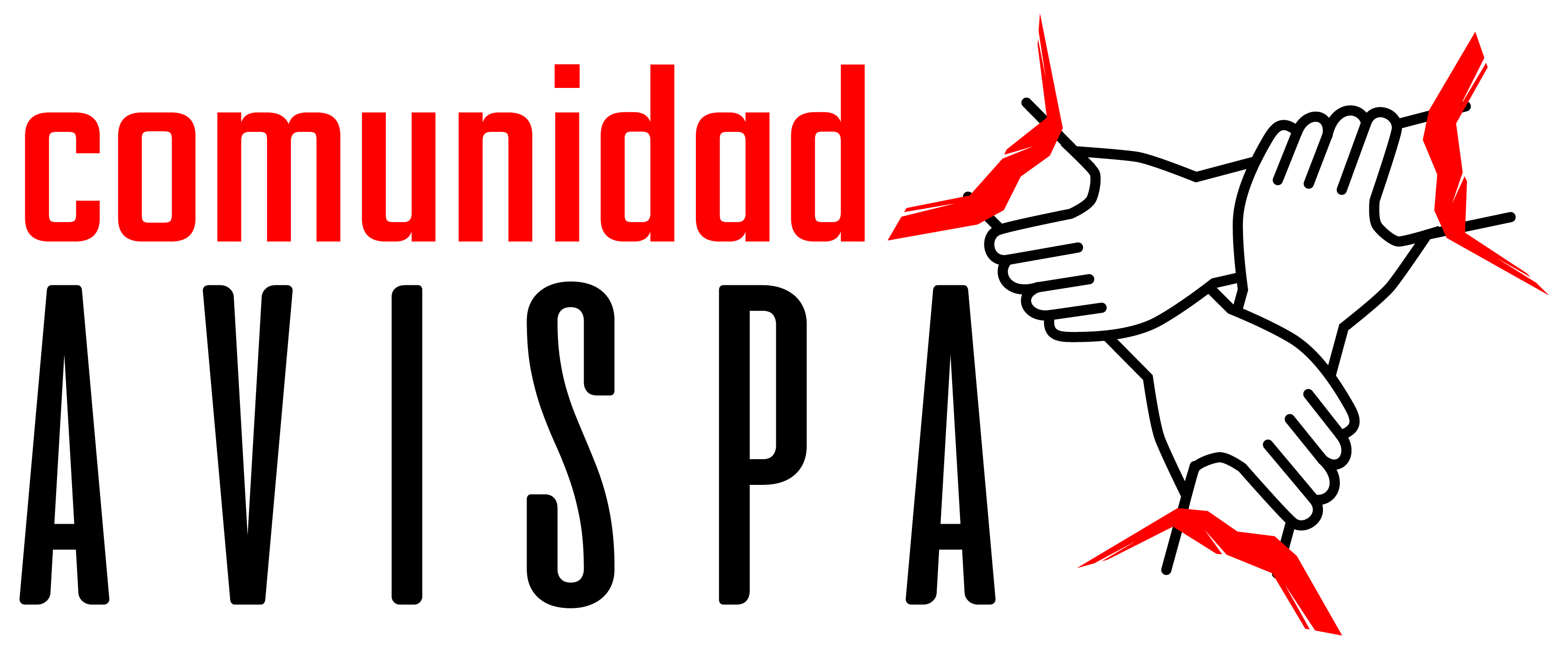Section of the Sonora Gas Pipeline that passes through the community of Loma de Bácum. Photo: Santiago Navarro F.
On September 29, Mexican President Andrés Manuel López Obrador signed an official decree restoring 2,900 hectares of territory to the Yaqui Tribe in Sonora. The order recognized the Indigenous group’s right to utilize 50% of the water from the Yaqui river for agricultural use in the eight towns that make up its territory. The rest of the water is destined for large-scale producers and the major urban zones in the region, including Hermosillo, the state capital.
The president announced the news in a public ceremony in the municipality of Vícam, where he asked for forgiveness for the wrongs committed by previous governments against the eight Yaqui towns: Loma de Bácum, Huirivis, Rahum, Potam, Belén, Vícam, Tórim, and Corit, or Loma de Guamúchil.
A few meters away from the event stood the traditional leadership of Loma de Bácum, who like the people of the community, known as the Tropa Yoeme (children, men, women, and elders), were not allowed into the event.
The council who represented the community of Loma de Bácum at the event, and in the previous negotiations with the government, was not elected by the community’s traditional methods, and does not have the consent of the Tropa Yoeme.

“We do not recognize this council because they are the ones who attacked the legitimate leadership and the community with firearms [in 2016] in an attempt to impose the gas pipeline on our community,” said Carmen García, of Bácum, the wife of Fidencio Aldama, a member of Bácum’s Traditional Guard.
Fidencio was arrested in October 2016, just after the armed group attacked the community. He was sentenced to fifteen years and six months in prison on false charges stemming from the one death that occurred during the attack. Today, people from the group of attackers are the same ones sitting down with those from the rest of the villages to hear the government’s decree.
Carmen told Avispa Midia, “All of this began because they wanted to impose authorities that would accept the gas pipeline.” The final straw, she said, “was when they arrived armed and shooting. My husband was part of the Traditional Guard and together with the other members, they tried to protect the community. They unjustly accused my husband, despite the fact that we presented evidence contradicting their frame-up, like the type of gun that our Traditional Guard legally uses as opposed to the type used in the murder. In addition to my husband’s arrest, ten members of our community were disappeared in July. What they are trying to do is weaken our community to make way for the passage of the pipeline and mining projects in the region,” said Carmen.
Carmen is referring to a natural gas pipeline project called Gasoducto Sonora, or Sonora Pipeline, which began construction in 2012. The project belongs to the US-based company Sempra Energy and is operated by IEnova, its subsidiary in Mexico. It is divided into two segments totalling 830.56 kilometers: the Gasoducto Sásabe-Guaymas (CSG) segment and the Gasoducto Guaymas-el Oro (CGO) segment, which crosses Indigenous Yaqui territory.
Anabela Carlón, a Yaqui lawyer in Loma de Bácum, maintains that the high level of violence in the region is linked to an attempt to implement several projects in Yaqui territory. “The people who were disappeared were people who have opposed mining exploitation, the construction of the Independence Aqueduct—which supplies water to the capital of Hermosillo—and the Sonora Pipeline, which was supposed to pass only 300 meters from the community.”
“Two days after our brothers were disappeared, the state informed us about measures to reroute the pipeline because we stand firm against allowing it to cross through Loma de Bácum. After the disappearances, we heard nothing more, and today, they’ve brought us this decree. Despite their claim that it benefits us, we don’t really know what it actually means,” said Carlón, since the federal government is legitimizing the Indigenous leaders who are in favor of the projects.
Pressure to Finish the Pipeline
Sempra Energy was supposed to be supplying the Mexican government with transportation and sales of natural gas fracked in the United States since 2014. They never finished building the infrastructure, though, and have not provided any gas.
However, Sempra’s 2021 financial statement informs their investors that their affiliate IEnova has received payments stemming from a force majeure clause in the contract. This means that the Mexican government must pay the company despite lack of service since, as IEnova claims, the refusal of Loma de Bácum’s residents to allow the pipeline through their territory counts as an uncontrollable factor or force majeure. These payments were made from 2017 to 2019.
Obrador’s administration renegotiated the contracts with IEnova, which were signed before his term began, considering them “opportunistic and abusive.” They agreed on a suspension of force majeure payments and that payments for services would be resumed when the damaged section of the Guaymas-el Oro section, located in Loma de Bácum, is repaired.
According to a Sempra Energy report, “If the pipeline is not repaired before March 14, 2021, and the parties do not agree on a new date to begin service, IEnova reserves the right to terminate the contract and try to recover its reasonable and documented costs and lost profits.”
In addition, the report warned, “If IEnova is unable to make the repairs,” which they have not yet begun, “and resume operations in the Guaymas-El Oro section of the Sonora pipeline, or if IEnova terminates the contract and cannot obtain compensation, there may be a significant adverse impact on Sempra Energy’s operational results and cash flows and in our capacity to recover the book value of our investment.”

This date has already passed, and the Obrador government is doing everything possible to get the Sonora Pipeline running to avoid having to deal with what the company might do. The Mexican government has not yet made an official statement regarding Sempra’s possible actions.
Up through 2018, 17 other pipelines in addition to the Sonora Pipeline, owned by several companies including Carso and TransCanada, charged for services they didn’t provide. This is detailed in Avispa Midia’s report “Sempra Energy: The Real Winner in Mexico’s Energy Reform.” According to the 2018 financial report from the Federal Electricity Commission (CFE), the total cost to the Mexican government was $16 billion. When López Obrador took power, the government paid an additional $672 million in force majeure payments to these projects.
“That’s why it stands out to us that they haven’t let our traditional leaders be present, who obviously, together with the majority of the community, oppose this project. Because of the risk it implies and because it does not bring us any benefit,” said Carmen.
Carlón said, “If there are other communities who want the gas pipeline, then let them build it there instead. Here, we will not accept any money or project because we don’t want it. Now we want our missing brothers to return and we want the state to free Fidencio Aldama, who is unjustly imprisoned.”
Residents of Loma de Bácum unfurled banners at the government’s event. Expressions of rage stood out on the faces of the women who, just two days before, had been officially informed that their missing loved ones’ remains had been found. “They are five of the ten men who were disappeared on July 14,” said the Yaqui lawyer, who has joined the search for the missing men.
This October 27 will mark five years that Fidencio Aldama has been imprisoned in Ciudad Obregón, Sonora. Activists and collectives that work against prisons and the prison industry, who are also part of a campaign to free Fidencio, are preparing actions to continue demanding his immediate release.


